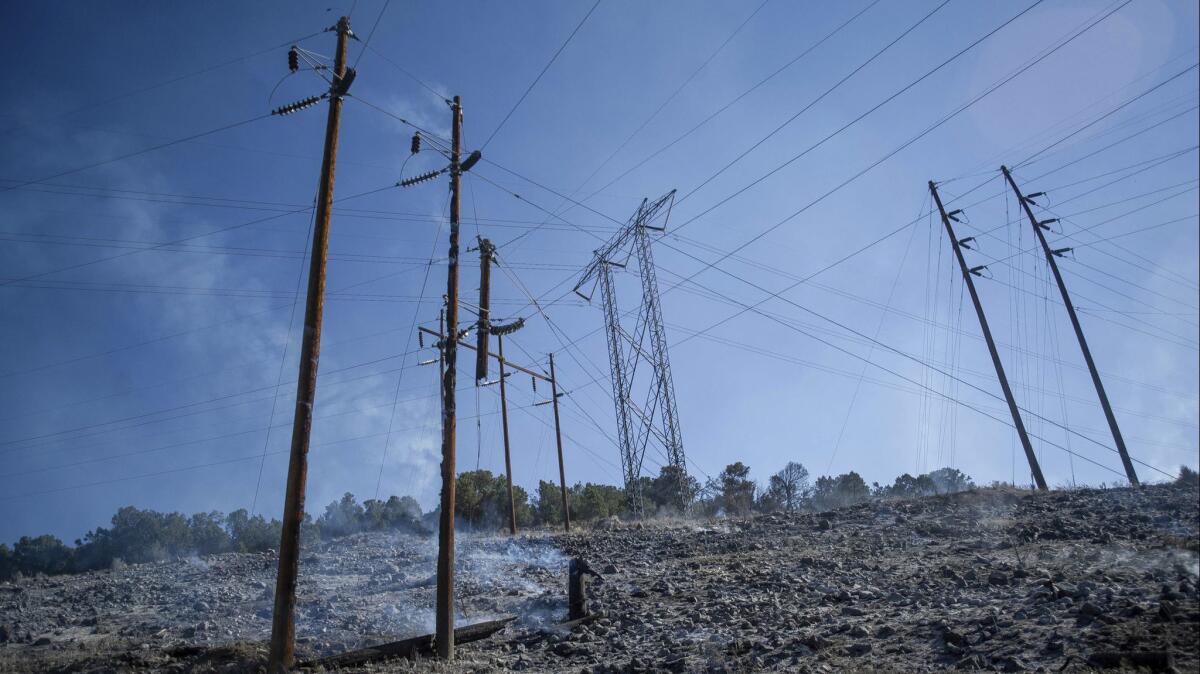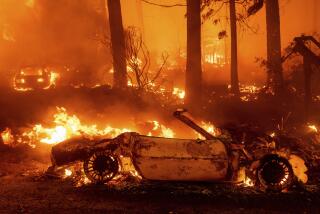Editorial: Who should pay the cost of California’s wildfires?

Downed power lines and sparking electrical equipment ignited many of California’s recent devastating wildfires, including about a dozen of the blazes that raged through Northern California in a massive deadly firestorm last year. The 2017 Thomas fire, the state’s largest wildfire in history in terms of acreage,may also have been started by downed power lines. Indeed, in recent years, electrical equipment or lines are among the three leading causes of wildfires in California.
When power-related equipment causes a fire, the utility that owns it must pay for the damage to homes and property, even if there was no negligence. Under the concept of “inverse condemnation,” the government must provide fair compensation when it damages private property, regardless of fault. The courts have applied this strict liability doctrine to privately owned public utilities as well, reasoning that they are in effect public entities making a public use of property. The costs associated with an inverse condemnation — for example, the payouts to homeowners whose neighborhoods were destroyed in a wildfire — have for years been spread broadly across the population as government agencies and utilities passed them on to residents and ratepayers.
But for investor-owned electric utilities such as Southern California Edison, there’s a twist. Utilities can’t raise rates without the approval of the California Public Utilities Commission. And the PUC now appears to be laying down a tough line: In order to recoup the costs of an inverse condemnation from ratepayers, a utility must show that it was a “prudent” manager of its infrastructure.
Last year, the PUC denied a request by San Diego Gas & Electric to raise rates to cover $380 million in claims from wildfires in 2007 after a court said the utility did not properly trim trees and manage vegetation near the damaged properties. This decision shook the state’s three big investor-owned electric utilities — Edison, SDG&E and Pacific Gas & Electric — which say they face financial ruin if they can’t recoup the cost of inverse condemnations, particularly as the higher temperatures, drought and the accumulation of millions of dead trees combine to increase the risk of devastating fires.
Enter the Fray: First takes on the news of the minute from L.A. Times Opinion »
State lawmakers will grapple with how to allocate costs from wildfire damage claims this month in a conference committee set up specifically to hammer out new rules for wildfire liability. The committee will also explore ways to prevent or limit the damage from wildfires, such as by requiring better vegetation management and by setting clear protocols for cutting power during high-risk weather. With fires raging around the state, this discussion couldn’t come at a better time.
It is reasonable to examine whether there might be a fairer way to assign costs than holding utilities strictly liable through inverse condemnation; after all, utilities can’t refuse to serve areas prone to wildfires or charge customers higher rates based solely on fire risk. Nevertheless, lawmakers must be careful not to give utilities a pass by removing the financial imperative to ensure their equipment doesn’t start fires. And frankly some of the proposals circulated in Sacramento in recent months would do just that.
One of the more troubling proposals would relieve utilities of liability for damages if the actions they took were prudent, but would define as “prudent” any step taken (or not taken) while the utility was following a safety plan approved by regulators. This means that if a potentially important safety precaution wasn’t detailed in the plan — for example, if the plan lacked equipment maintenance schedules or minimum staffing levels for equipment inspectors — any inaction by the utility on that front would automatically be considered “prudent” and any liabilities incurred could be passed on to ratepayers. Utilities are already required to have safety and wildfire mitigation plans. Although there’s nothing wrong with seeking improved safety measures in light of increased wildfire risk, this proposal seems particularly dangerous.
Nor should lawmakers sacrifice the protection that inverse condemnation provides those whose property is damaged by fire, or the incentives it gives utilities to ensure that their equipment doesn’t start fires. We welcome a reexamination of how California prepares for wildfires and pays for the aftermath, so long as the Legislature doesn’t let utilities off the hook and leave ratepayers holding the bill.
Follow the Opinion section on Twitter @latimesopinion and Facebook
More to Read
A cure for the common opinion
Get thought-provoking perspectives with our weekly newsletter.
You may occasionally receive promotional content from the Los Angeles Times.






